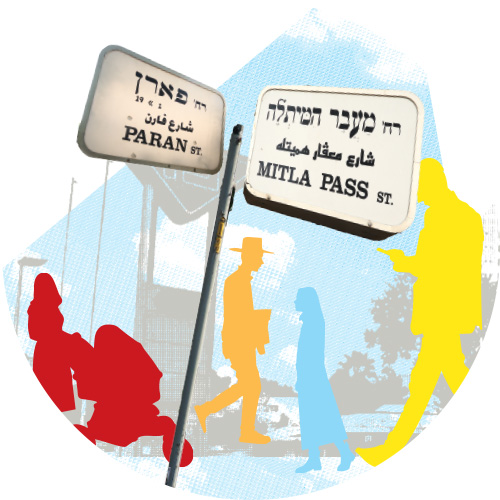Growth Curve: Chapter 3

Best to keep it vague. The extra 800 shekel came out to a pitiful per-hour rate, and it’s not like his base salary was any better

“SOhow’s the best couple doing?”
If Tziporah ever needed a cheerleader in her life, her older sister Dini was happy to fill the role. From her perch in Passaic, she offered Tziporah a steady stream of compliments, encouragement, and emotional support.
“We’re doing good, Dini, how are you?”
“Everything’s fine here, steady. Kids are okay in school, Shimmy okay at work, I’m getting used to the new job. Tell me about the great stuff you and your husband are doing for the yeshivah bochurim of Yerushalayim. I love hearing how my little sister is saving the world!”
Tziporah switched the phone to a headset and got busy folding laundry as she updated Dini on Benny’s newest promotion at Ner Olam. “Reb Motti and the rosh yeshivah must be happy with him, because they asked him to take over the Friday learning program. Friday’s a challenging day for these guys. They put in a long week, a lot of them aren’t used to such an intense learning schedule. So when Friday comes a lot of them just want to sleep in or go on trips. It’s really important to have a great program in place if you want them in the beis medrash.”
“Mmm, I hear that,” Dini said. “So they asked Benny to do it? So impressive!”
“Yeah.” Tziporah felt warm, proud. “Benny has all these ideas to make Fridays different and exciting. He’s starting a shnayim mikra incentive program, and a chazarah system for Gemara, with points. And iced coffee and rugelach every week. Then, at the end of the month, he’s going to take the guys who showed up on a great trip — hiking, barbecue, kumzitz, the works. He’s all pumped about it.”
“Wow, I love it,” Dini said. “They’re lucky to have him. I hope they’re paying him more for all the extra hours.”
“Yeah, they’re giving him some more,” Tziporah said.
Best to keep it vague. The extra 800 shekel came out to a pitiful per-hour rate, and it’s not like his base salary was any better.
“And how are you, working hard?” Dini asked.
“Yeah, I’m starting to feel the pressure. The tax deadline for people living outside the US is June 15, so that means my manager is getting tense, the to-do lists are a little longer. But honestly, I can handle it. It’s only the last week or two that things get really crazy.”
“My super-capable sister, huh. And how are the three Sabra cuties doing?”
“They’re adorable, I wish you could see them.” Tziporah smiled into the phone. “The baby is starting to say ma-ma, I love that stage.”
“Send me pictures!” Dini commanded. “Whoops, I’d better go, that’s Shimmy clicking in. Speak to you!”
Tziporah hung up the phone and removed the headset. She continued folding the laundry, steadily covering the dining room table with neat piles. She felt buoyant, accomplished, satisfied. Dini had called them the “best couple,” and there was no greater compliment. The best couple, the couple that was on the same page, the couple that supported one another and shared goals and dreams and victories.
Not like her parents. Not like Ima, who couldn’t let Abba be, who needled and whined and blamed and nagged the life out of him.
Abba. He was a gentle, artistic soul who hated the rush and crush of the big city. The house in Maine with the trees and open sky was his refuge, Tziporah knew that. But Ima hated every inch of that house. She wanted to be near the shopping, the action, the pulsing energy of New York.
And instead of appreciating her gentle husband, she was determined to mold him according to her tastes. Tziporah still clenched inside as she remembered that time Abba had brought home a gift for Ima: a delicate charm necklace, a beautifully crafted tiny bird hanging from a silver chain.
Ima had held the bird charm in her hands, examined it carefully, then put it back inside the box. Her nostrils had flared.
“Yaakov,” she said, “I know you love nature, I know you. But do you know me? If you want to give me a present, I don’t want your birds or trees or flowers. Take me back to civilization.”
At some point Abba couldn’t stand it anymore. He gave in and moved the whole family to New York. The heart attack came a few years later, but he had lost his life force long before.
Tziporah was aware the heart disease wasn’t a new development — he’d always been frail — but she knew there had to be some price for wearing down a person, causing them so much grief and pain just for being who they are.
She wasn’t sure what kind of guy she would marry, what kind of life they would have together, but one thing she was absolutely sure of: She would never hold back her husband from being himself.
When she got engaged to Benny and he suggested starting out in Israel, she liked the idea. She wanted to put distance between her new marriage and Ima, and she was curious to see the haunts that Benny had described when talking about Yeshivas Ner Olam: the park with the broken swing ringed by olive trees where he and his friends had done midnight push-up contests, the spot just outside the Old City Walls where you could see the barest outline of Jordanian territory, the catering business where he’d earned a few extra shekels by stirring huge pots of Yerushalmi kugel on Thursday nights.
She thought they would stay in Ramat Eshkol for two, three years tops, and then they’d move back and Benny would get a real estate license like his dad, or start an Amazon business like his brother.
But five years later they were still here, with Benny now working in Yeshivas Ner Olam, doing great things with the bochurim, and their family managing to get through the month with the yeshivah paycheck supplementing her accounting job, and rent money coming in every month from that little property in Houston that Benny’s dad had purchased for them as a wedding gift. For now it was working, and she was grateful to be a 40-minute walk from the Kosel, bringing up the kids where life was simple and sweet.
Dini knew all about their financial situation, the way they made things work, the bochurim they hosted and the inspiration they found on the streets of Yerushalayim. But there was one piece she’d never share with Dini: That they were still there, still living in Eretz Yisrael, because she chose to give Benny the chance to grow into something bigger.
She still remembered that night in the Gan Eshkolot park. A gray cat had stared at them curiously as they braked Yehuda’s stroller and found seats on an empty bench.
“Listen, Tzip, I know the plan is to go back,” Benny had said in a sudden rush of words. “I’m supposed to get my real estate license or something like that, go to work, make a normal salary, find some time for the daf every night.”
Tziporah had sat quietly, watching the gnats circle the silent swing set.
“But can I be honest with you, Tzip? I don’t think I’ll be the person I was meant to be if I leave learning, if I leave Eretz Yisrael, right now. I’m starting to see what I can know, what I can be, and if we go back now, I’m going to lose that.”
He looked at her. She focused on the swing set.
“I want to stay,” he said simply. “But obviously I want you to be happy, Tzip. If you want to go back, we go back, we’re in this together. So… can we do this? Are you with me?”
The cat glared at them, then ran between the legs of the adjoining bench into the darkness. Tziporah shivered.
And then she made the conscious decision to give it a chance.
Not only because she was determined never to become that needling, nudging, negative woman that was Ima. Not only because she was determined never to lose the “best couple” sticker.
More because she’d always been a person who admired sincerity — and there’s nothing more sincere than a guy who wants to grow.
“So that’s Tosfos. You got it? It works?”
Chaim and Meir nodded. They were a good chavrusa-shaft — Chaim Markowitz was quick and intuitive, Meir Elbogen slower and more thorough. Benny enjoyed working with them, watching how they found clarity together.
“Great, so keep Tosfos in mind, and now we’re going to add another layer. Here, let me show you,” Benny said.
He looked back down at the Gemara. Wait, was that a hand on his shoulder?
Benny looked up. “Hey, of all people! Dave, how are you? Guys, this is my old friend Dave Rothman, a proud Ner Olam alumnus now living in— where are you living these days, Dave?”
Dave smiled. “I’m living in Monsey,” he said. “Actually my second house now, we sold the first one and bought something bigger.”
“Nice,” Benny said, taking in the two open shirt buttons, the suede loafers, the custom cut of Dave’s jacket. “And you’re here because —”
“Because I needed a recharge, you know? Business is good, great actually, but it’s beyond draining. It’s a very tough market these days, you gotta jump on the next deal before anyone else hears about it, lots of competition. If you relax, you lose.
“So I was dreaming of a break,” Dave went on. “Vasikin at the Kosel, falafel in Geula, a visit with the rosh and Reb Motti…you know what I mean? So I booked tickets and came here for three days. And it’s been amazing so far, a real boost. I even got into Rav Yekutiel, I have this friend who has connections over there… But let me tell you, this afternoon I walked into yeshivah, and that was the best. Things really don’t change here, Reb Motti’s still teaching with the same fire, just like the old days. And the rosh — he still knows how to give you that look, the X-ray vision thing that makes you feel like a kid again.
“You two,” he addressed Chaim and Meir, “you don’t even realize how lucky you are. You gotta make the most of every minute, I hope you realize.”
Chaim nodded. Meir just gazed at Dave, lips pursed. His grand pronouncements, Benny noted, did not impress either of them.
Dave moved aside purposely, indicating that Benny follow him to the side of the beis medrash.
“Listen, Benny, I want to catch up with you for real. Can you do dinner tonight?”
“Sounds good,” Benny said. “I’ll just check with the wife, but it should be fine.”
“Great. Should we do Entrecote? I would invite you to eat with me at the hotel restaurant, but I’m hearing that the hard-core chareidim don’t like the hechsher there. Are you hard-core yet?” Dave laughed easily.
Benny pulled his lips into a smile. “Entrecote sounds good to me,” he said. “Closer, easier, more practical.”
Was he hard-core yet? He didn’t think of himself as hard-core, that’s for sure. He and Tziporah had this great balance — serious about the serious things, but fun and colorful and up-to-date when it came to the rest. That’s why he was so good for this job, that’s why the bochurim found him approachable. He kept on top of the American sports scene, he rode an electric bike, his winter sweaters were a lot more varied than the yeshivish black/navy/charcoal color palette. Definitely not hard-core.
But he tried to imagine how he appeared to Dave. Cheap wrinkle-free white shirt that still somehow managed to look wrinkled, weathered belt, velvet yarmulke with a telltale dusty black patina. And a job explaining Gemara to guys who found movies eminently more thrilling than the Maharsha.
“Great, so let’s do 7:30,” Dave said. “Seder will be over by then, right? Don’t want to keep you away from your job.”
Was that a note of condescension Benny was hearing? His shoulder stiffened. He looked around at the beis medrash, then back at Dave’s open, earnest face. Old friends are old friends, and he and Dave had done some real growing and changing together back when they were bochurim finding their way in a new, intimidating yeshivah far from home. Dave might look suave and cool and all-knowing, but Benny knew that he possessed one of the biggest, warmest hearts of anyone who’d sat in the Ner Olam beis medrash. And a plate of aged steak didn’t sound too bad either.
“Sure, looking forward,” he said.
to be continued…
(Originally featured in Mishpacha, Issue 926)
Oops! We could not locate your form.



